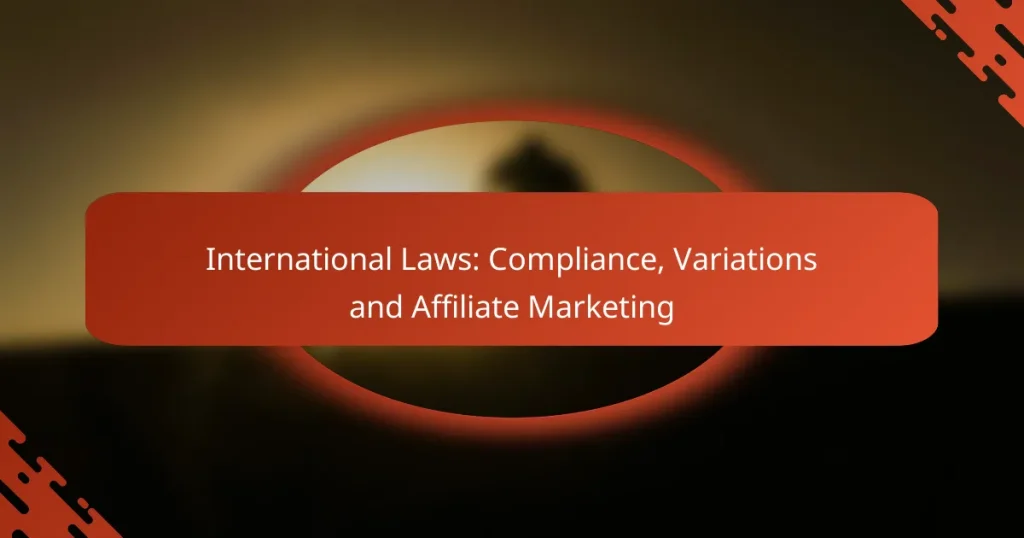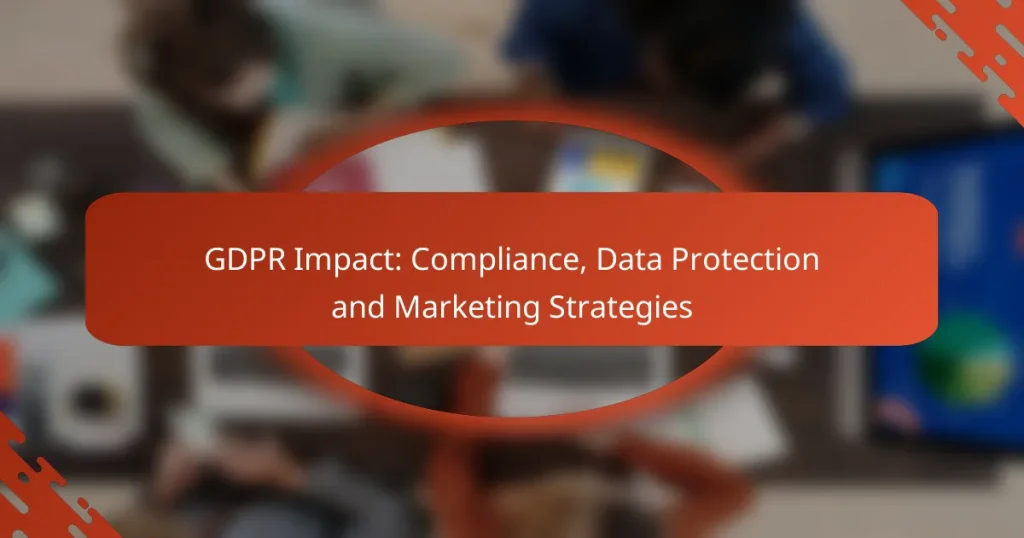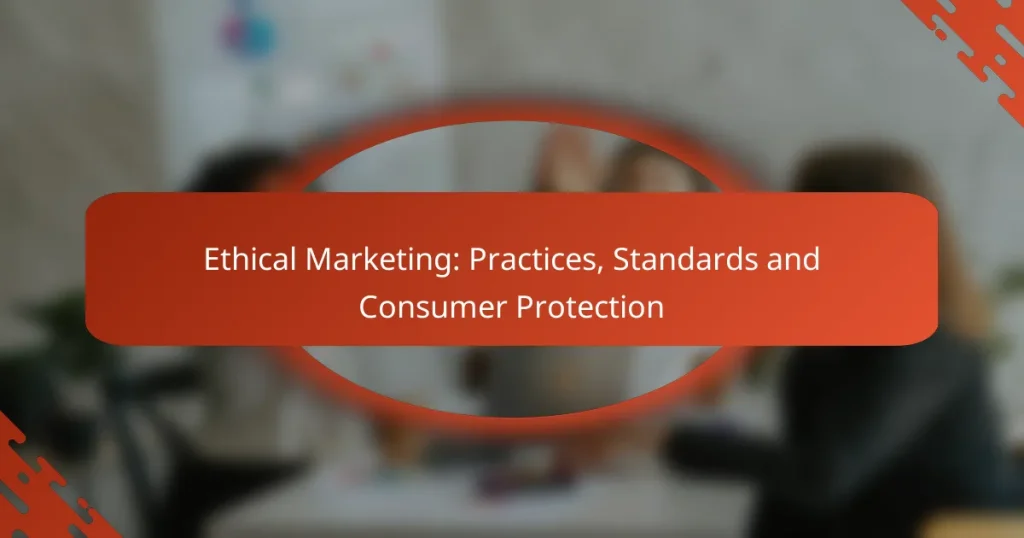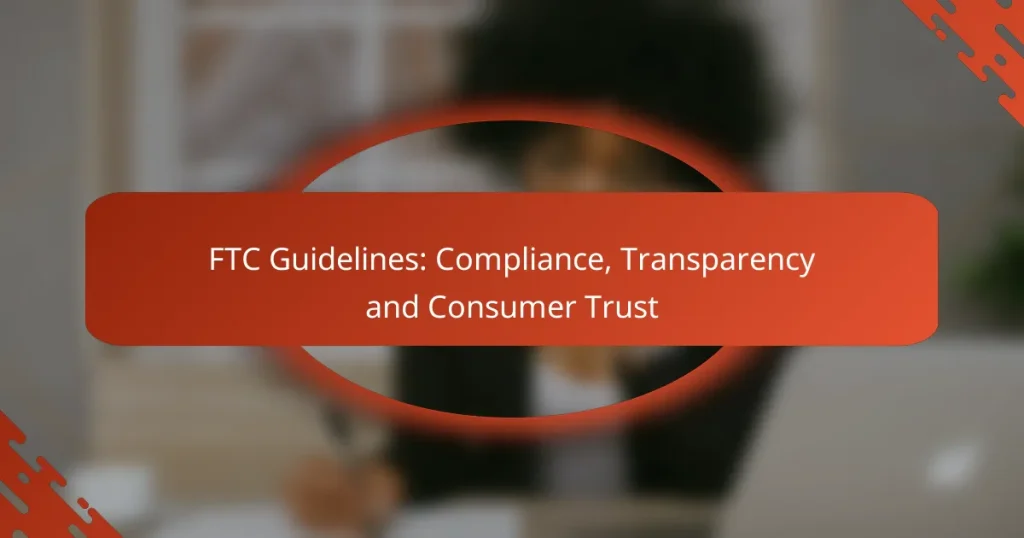Affiliate marketing operates within a framework of legal and ethical considerations that are essential for maintaining trust and compliance. In the United States, affiliates must navigate regulations set by the Federal Trade Commission (FTC) and adhere to state-specific laws while ensuring transparency and honesty in their advertising practices. By understanding the potential legal pitfalls and prioritizing ethical standards, affiliates can protect their brand reputation and foster positive relationships with their audience.
Compliance in Affiliate Marketing: Best Practices and Legal Standards
Affiliate Links: Disclosure Methods and Audience Engagement
GDPR Impact: Compliance, Data Protection and Marketing Strategies
Ethical Marketing: Practices, Standards and Consumer Protection
Affiliate Marketing Disputes: Legal Handling and Resolution Strategies
FTC Guidelines: Compliance, Transparency and Consumer Trust
What are the legal requirements for affiliate marketing in the United States?
Affiliate marketing in the United States is governed by several legal requirements that ensure transparency and fairness in advertising. Key regulations include guidelines from the Federal Trade Commission (FTC), state-specific laws, and tax obligations that affiliates must adhere to.
FTC guidelines on disclosures
The FTC requires affiliates to disclose their relationships with brands when promoting products or services. This means that if an affiliate earns a commission from a sale, they must clearly inform their audience, typically through a statement like “I may earn a commission if you purchase through my link.”
Affiliates should place these disclosures prominently, ideally at the beginning of their content, to ensure that consumers are aware of the potential for bias. Failure to comply can result in penalties or legal action from the FTC.
State-specific regulations
In addition to federal guidelines, some states have their own regulations affecting affiliate marketing. For instance, California has specific laws regarding online advertising and consumer privacy that affiliates must follow.
Affiliates should familiarize themselves with the laws in their respective states, as non-compliance can lead to fines or other legal repercussions. Consulting with a legal professional can help clarify any state-specific requirements.
Tax obligations for affiliates
Affiliates in the United States are responsible for reporting their earnings as income, which may be subject to federal and state taxes. Generally, if an affiliate earns above a certain threshold, they will receive a 1099 form from the affiliate program, which must be reported to the IRS.
It’s advisable for affiliates to keep detailed records of their earnings and expenses to accurately report their income and take advantage of any potential deductions. Consulting a tax professional can provide guidance on managing these obligations effectively.
How to ensure ethical practices in affiliate marketing?
To ensure ethical practices in affiliate marketing, affiliates must prioritize transparency, honesty, and respect for user privacy. These principles help build trust with audiences and comply with legal standards.
Transparency with audiences
Transparency involves openly disclosing affiliate relationships to your audience. This means clearly stating when you earn a commission from links or promotions, which fosters trust and credibility.
Consider using phrases like “I may earn a commission” or “This post contains affiliate links” at the beginning of your content. This simple disclosure can significantly enhance your relationship with readers.
Honesty in product representations
Honesty means accurately representing the products or services you promote. Avoid exaggerating benefits or making false claims, as this can lead to legal repercussions and damage your reputation.
Provide genuine reviews based on personal experience or thorough research. If a product has limitations, mention them to give your audience a balanced view.
Respecting user privacy
Respecting user privacy entails safeguarding personal information collected through affiliate links or tracking. Ensure compliance with regulations like GDPR or CCPA, which mandate clear consent for data collection.
Implement privacy policies that inform users about data usage and offer opt-out options. Regularly review your practices to align with evolving privacy standards and maintain user trust.
What are common legal pitfalls in affiliate marketing?
Common legal pitfalls in affiliate marketing include misleading advertising claims, failure to disclose affiliate relationships, and intellectual property violations. Understanding these issues is crucial for maintaining compliance and protecting your brand’s reputation.
Misleading advertising claims
Misleading advertising claims occur when affiliates make false or exaggerated statements about a product or service. This can lead to legal action from consumers or regulatory bodies if the claims are deemed deceptive.
To avoid this pitfall, ensure that all promotional content is truthful and substantiated. For example, if an affiliate claims a product can significantly improve health, they should have credible evidence to back that statement.
Failure to disclose affiliate relationships
Failing to disclose affiliate relationships can violate regulations set by the Federal Trade Commission (FTC) in the United States and similar bodies in other countries. Affiliates must clearly inform their audience when they earn commissions from the products they promote.
A simple way to comply is to include a clear disclaimer in promotional materials, such as “I may earn a commission if you purchase through my links.” This transparency builds trust and keeps you within legal boundaries.
Intellectual property violations
Intellectual property violations happen when affiliates use copyrighted materials, trademarks, or patents without permission. This can lead to lawsuits and significant financial penalties.
To prevent these issues, always seek permission before using someone else’s content or branding. Familiarize yourself with copyright laws and consider using royalty-free images or licensed content to stay compliant.
What frameworks exist for ethical affiliate marketing?
Ethical affiliate marketing is guided by various frameworks that promote transparency and fairness. These frameworks include industry codes of conduct and best practices established by leading affiliates to ensure compliance and build trust with consumers.
Industry codes of conduct
Industry codes of conduct serve as guidelines for ethical behavior in affiliate marketing. Organizations such as the Federal Trade Commission (FTC) in the United States and the European Advertising Standards Alliance (EASA) provide rules that affiliates must follow, such as disclosing relationships with brands and ensuring truthful advertising.
Adhering to these codes helps affiliates avoid legal pitfalls and fosters a trustworthy relationship with their audience. For instance, clear disclosure of affiliate links can enhance credibility and prevent misleading claims.
Best practices from leading affiliates
Leading affiliates often set the standard for ethical practices by prioritizing transparency and value. They recommend disclosing affiliate relationships prominently, using clear language to inform readers about potential commissions earned from purchases.
Additionally, successful affiliates focus on providing high-quality content that genuinely helps their audience. This includes reviewing products honestly and avoiding exaggerated claims, which can lead to distrust and damage reputation.
How can affiliates protect themselves legally?
Affiliates can protect themselves legally by understanding their rights and responsibilities, utilizing contracts, and seeking legal advice when necessary. These steps help ensure compliance with regulations and safeguard against potential disputes with merchants.
Utilizing contracts with merchants
Contracts with merchants are essential for affiliates to define the terms of their partnership clearly. These agreements should outline commission structures, payment terms, and the responsibilities of each party. A well-drafted contract can prevent misunderstandings and provide a legal basis for resolving disputes.
When creating a contract, affiliates should include clauses that address termination conditions, liability limitations, and confidentiality. It’s advisable to review similar agreements in the industry to understand common practices and expectations.
Consulting legal experts
Consulting legal experts is a proactive step for affiliates to ensure their marketing practices comply with applicable laws. Legal professionals can provide insights into regulations such as the Federal Trade Commission (FTC) guidelines in the U.S. or the General Data Protection Regulation (GDPR) in Europe, which affect affiliate marketing.
Affiliates should consider engaging a lawyer experienced in digital marketing or e-commerce to review contracts and advise on compliance issues. This investment can save affiliates from costly legal troubles and enhance their credibility in the marketplace.
What trends are shaping the future of legal and ethical affiliate marketing?
Legal and ethical affiliate marketing is increasingly influenced by regulatory changes and the rise of ethical networks. These trends are crucial for marketers to navigate the evolving landscape and maintain compliance while fostering trust with consumers.
Increased regulatory scrutiny
Regulatory scrutiny in affiliate marketing is intensifying as governments worldwide implement stricter guidelines. Marketers must stay informed about laws such as the Federal Trade Commission (FTC) regulations in the U.S. and the General Data Protection Regulation (GDPR) in Europe, which dictate transparency and consumer rights.
To comply, affiliates should clearly disclose their relationships with brands and ensure that their marketing practices respect consumer privacy. Regular audits of marketing strategies can help identify potential compliance issues before they escalate.
Emergence of ethical affiliate networks
Ethical affiliate networks are gaining traction as brands and marketers prioritize transparency and integrity. These networks often vet affiliates to ensure they adhere to ethical marketing practices, fostering a trustworthy environment for consumers.
Joining an ethical affiliate network can provide benefits such as access to like-minded partners and enhanced credibility. Marketers should consider aligning with networks that emphasize ethical standards to build a positive brand reputation and attract conscientious consumers.






